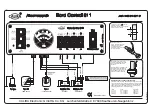
&
Tire care
–
maintenance and
safety practices
.
Check on a daily basis that the
tires are free from serious damage,
nails, and stones. At the same time,
check the tires for abnormal wear.
.
Inspect the tire tread regularly
and replace the tires before their
tread wear indicators become visi-
ble. When a tire
’
s tread wear
indicator becomes visible, the tire
is worn beyond the acceptable limit
and must be replaced immediately.
With a tire in this condition, driving
at even low speeds in wet weather
can cause the vehicle to hydro-
plane. Possible resulting loss of
vehicle control can lead to an
accident.
.
To maximize the life of each tire
and ensure that the tires wear
uniformly, it is best to rotate the
tires every 7,500 miles (12,000 km).
For information about the tire rota-
tion order, refer to
“
Tire rotation
”
F
11-38
.
Replace any damaged or
unevenly worn tires at the time of
rotation. After tire rotation, adjust
the tire pressures and make sure
the wheel nuts are correctly tigh-
tened. For information about the
tightening torque and tightening
sequence for the wheel nuts, refer
to
“
Flat tires
”
F
9-6
.
&
Vehicle load limit
–
how to
determine
The load capacity of your vehicle is
determined by weight, not by avail-
able cargo space. The load limit of
your vehicle is shown on the
vehicle placard attached to the
driver
’
s side B-pillar. Locate the
statement
“
The combined weight
of occupants and cargo should
never exceed XXX kg or XXX lbs
”
on your vehicle
’
s placard.
The vehicle placard also shows
seating capacity of your vehicle.
The total load capacity includes the
total weight of driver and all pas-
sengers and their belongings, any
cargo, any optional equipment such
as a trailer hitch, roof rack or bike
carrier, etc., and the tongue load of
a trailer. Therefore cargo capacity
can be calculated by the following
method.
Cargo capacity = Load limit
−
(total
weight of occ total weight
of optional equ tongue
load of a trailer (if applicable))
For information about vehicle load-
ing, refer to
“
Loading your vehicle
”
F
8-12
.
NOTE
Your vehicle is neither designed
nor intended to be used for
trailer towing. Therefore, never
tow a trailer with your vehicle.
Consumer information and Reporting safety defects
13-11
–
CONTINUED
–
Содержание 2010 Impreza
Страница 2: ...This manual describes the following vehicle types 1 4 door 2 5 door and OUTBACK 3 WRX STI...
Страница 3: ......
Страница 29: ......
Страница 119: ......
Страница 169: ...4 2 Climate control Ventilator Air flow selection...
Страница 211: ......
Страница 293: ......
Страница 384: ...Fuse panel Fuse rating Circuit 18 15A Headlight right side 19 15A Headlight left side Specifications 12 9...
Страница 389: ......
Страница 407: ......
Страница 408: ...Index 14...
Страница 419: ...10 9 8 7 6 5 4 3 11 12 13 000134...
















































